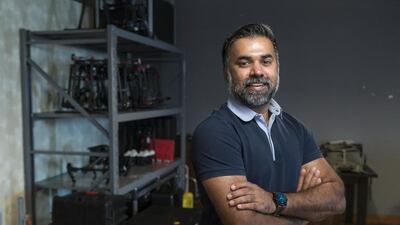Hatim Saleh is a man who has turned his love of gadgets into a career.
He is the director of Chopper Shoot Productions, which uses drones and helicopters to do aerial filming and photography for events and to document construction, shipping and oil and gas projects.
While he has worked on sports events such as the Abu Dhabi Desert Challenge and many TV productions, most of his business involves imaging and mapping massive construction sites, from Al Maktoum International Airport to the Dubai Expo 2020 site and the Dubai Opera District, ships, ports such as Khalifa Port, real estate projects such as Dubai Sports City and even oil rigs.
Drones are “the norm now, on almost every filming project”, says the 36-year-old Indian filmmaker, who trained to fly drones at an academy in the UK.
Mr Saleh, based in Dubai and married with two children, left school in Sharjah to become a film maker, filming safety videos for oil and gas companies. Flying model helicopters was just a hobby. But he realised he could combine his career and his hobby after noticing some UK companies attaching cameras to the mini helicopters. But with no ready-made helicopter cameras on the market, he had to make his own.
“Ten years ago I would attach cameras to the helicopters with DIY electronics – a unique concept at the time and I was the only one doing it in Dubai,” he says. “Now drones are easier to fly, with on-board GPS systems and fully automated flight. Back then we had to fly them completely manually.”
Chopper Shoot Productions has been running since 2005. It has nine staff, including four drone pilots, and owns nine drones, which can fly at up to 40 kilometres per hour. The company hires a helicopter for a real bird’s eye view as drones are only allowed to fly to altitudes of 120 metres.
A high-spec, professional drone can cost the company up to Dh90,000. Its small drones carry a Go Pro or similar camera, medium-sized drones carry DSLR cameras and the largest carry film cameras.
For filming, a pilot handles the drone and a cameraman with a tablet watches the live footage. Most drones fly up to 15 minutes before the battery goes.
Annemarie Franssen, is a client who is the communications and branding manager for Abu Dhabi Terminals. She says drone and helicopter filming is a cost-effective way for the organisation to show Khalifa Port container terminal from different angles and heights. “These are frequently asked for by our customers and stakeholders,” she says.
Marc Deek, the set marshal at Dubai Studio City media group Emotion, says that drones give “a more cinematic approach to the movie, similar to a helicopter but for less money”.
Since last year, drone owners have had to register with the federal General Civil Aviation Authority. Flying over or near airports, government buildings or bases, as well as residential areas, is forbidden.
Three years ago, Mr Saleh decided to run in-house training with UK-based The Aerial Academy to ensure his pilots were certified. While drone licensing has been in place in the UK for nearly a decade, where there are 1,500 licensed operators and 50 to 80 new applications a month, this has only just been introduced in the UAE and even in the US.
“Hobbyist users should not be operating in congested areas,” says Elliott Corke, the director at Aerial Academy. “The requirement for qualifications means that operators understand UK airspace and how to interact with air traffic control and with other air users. Hopefully the crackdown in other countries will allow legitimate operators to set up businesses and operate safely in US and UAE airspace.”
Since May, all drone users in Dubai have had to apply the Dubai Civil Aviation Authority for a registration card, which costs Dh50 for hobbyists and Dh500 for commercial operators.
For commercial use, permits are also required from the Dubai Film Commission, Dubai Police, the Ministry of Defence and the local transport authority, Mr Saleh says. Pilots need training certificates and only companies with a business licence for TV and film production, broadcast and non-broadcast can apply.
“The new Dubai regulations will make a difference. Companies that hire you will start asking for permits, which will filter out the freelancers. I have seen people flying drones close to the airport or routes used by VIP aircraft. There needs to be more training and courses along with the licensing.”
business@thenational.ae
Follow The National's Business section on Twitter

